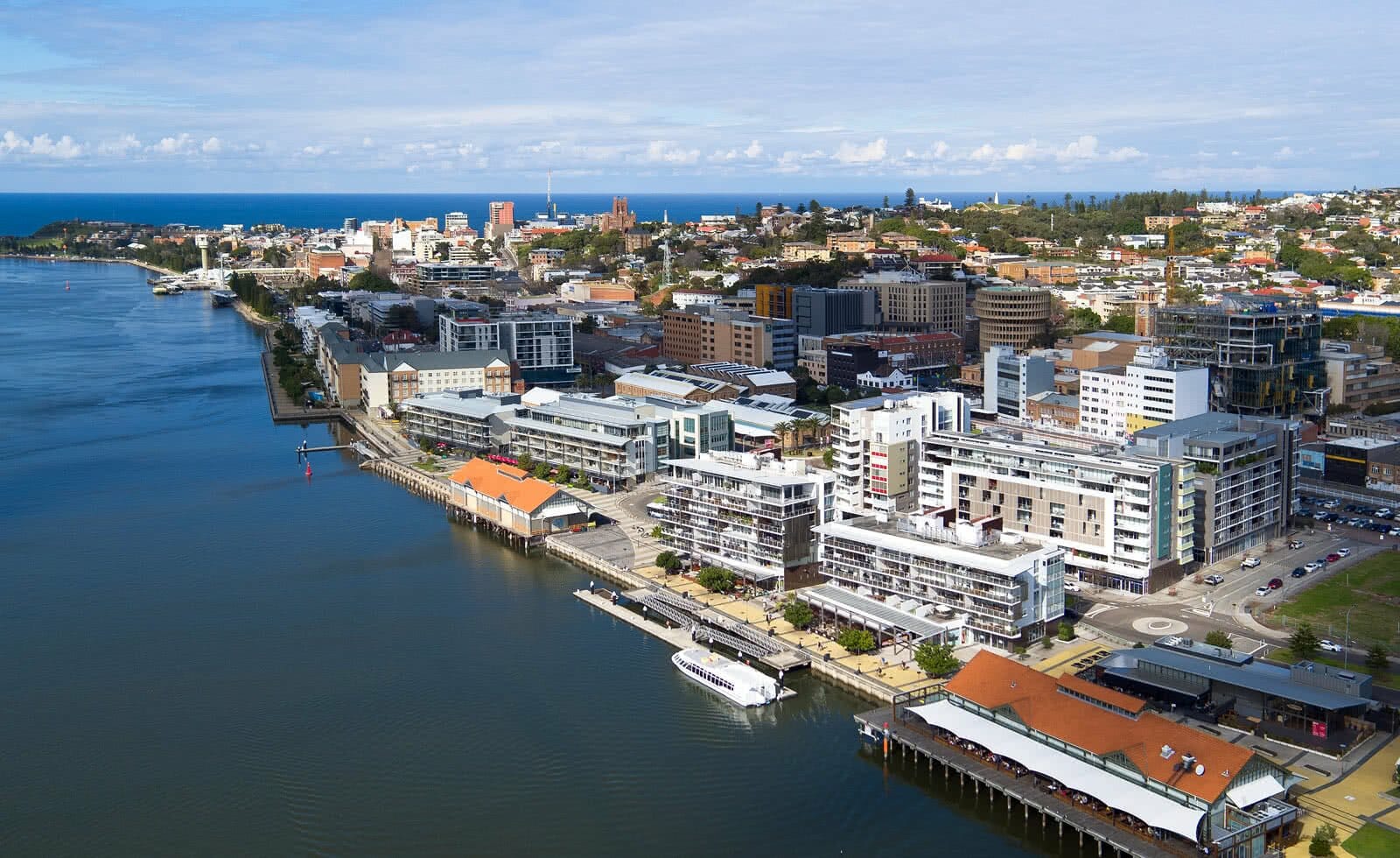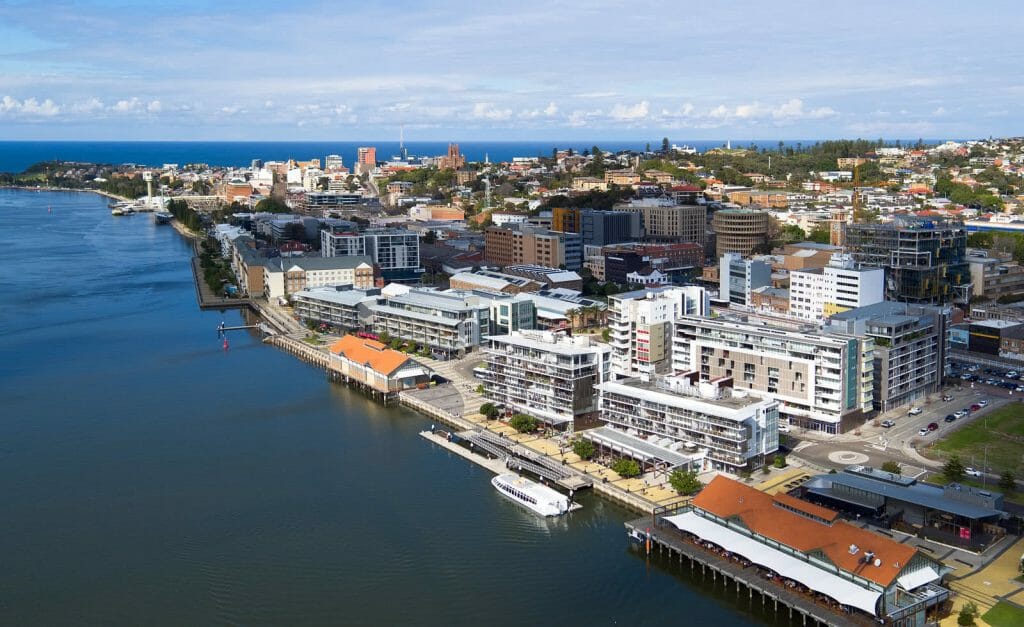Investing off the plan involves purchasing a property before it has actually been constructed. You will usually be able to view a display suite to get an idea of what the property will be like when it’s complete; however, as the name suggests, you are basing your purchase entirely off a plan, in accordance with agreed terms on a contract.
This is quite a popular investment option, especially for those in the Newcastle and Lake Macquarie areas wishing to take advantage of the current development boom. But if you’re buying your first investment property, is this a good option for you? What are the risks involved? What are the benefits?
The Leah Jay Property Investment Services team regularly works with investors purchasing new properties, so they have seen both sides of the story. From owners who were thrilled with their investment to those who had to deal with delays and uncertainty, we have witnessed upsides and downsides to this particular investment strategy. Let’s weigh up some of the pros and cons of investing off the plan.

Contents
Pros of Investing Off the Plan
Opportunity to get a lower price
Investing off the plan often means you will be able to secure a property for a discounted price, especially if you purchase early in the development process. Developers are keen to sell a good number of properties before construction begins, so prices are often cheaper for the first properties listed in a development.
For this reason, you should aim to take advantage of off-the-plan properties as early as possible in the development process. Getting in early also gives you the benefit of having first pick of the properties on offer, so you’re more likely to snap up the best of the bunch.
More time to save
When you purchase a property off the plan, you generally pay a 10% deposit upfront, but don’t have to pay the balance until construction is complete – usually one or two years later.
This gives you more time to save money before settling the purchase. As a first-time investor, this extra time can make it easier to enter today’s competitive property market.
The property might increase in value
Investing off the plan means purchasing a property at the current market value. Over the time it takes for the property to be built, there is a chance that its value will increase.
For example, you may purchase an off-the-plan apartment with a 10% deposit of $40,000. If, by the time the apartment is built, the market has grown and the property has increased in value to $450,000, you have already achieved 110% on your initial deposit.
Tax benefits
Once construction is complete and your property is producing income through rent, a range of tax deductions can be made. You can claim things like property management fees, repairs and maintenance, but perhaps the most useful deduction is depreciation claimed on fittings and fixtures.
As the fittings and fixtures are brand-new, their depreciable value is higher than that of an older property. This means you can potentially make savings through deductions at tax time.
Off-the-plan investors are particularly fortunate when it comes to these tax benefits. In November 2017, new legislation was introduced meaning that owners of second-hand residential properties are now ineligible to claim depreciation on plant and equipment assets. However, owners of brand-new investment properties are still able to claim depreciation – good news for those investing off the plan!
Cons of Investing Off the Plan
Risk of delay or development failure
Buying properties off the plan comes with a certain degree of risk. A commonly cited downside is that developments often take longer to complete than the initially stated timeframe.
One of Leah Jay’s owners, who was investing off the plan, was advised that the development would be completed in mid-August. However, the completion date was then moved to mid-November – a date that soon came and went, without any word from the agent or conveyancer. The owner was obviously keen to settle and finalise the loan, but could not move any further until a completion date was confirmed.
In worst-case scenarios, a development might not even go ahead at all due to the developer going bankrupt, as Newcastle recently saw with the Icon Central development.
If this happens, you should be entitled to your deposit back – although you might be waiting a while. Even so, by tying up your money in the development for such a period of time, you may have missed out on interest and capital gains through other investments. It’s even possible that you’ve run the risk of being priced out of the market by the time you start looking for a new investment.
For example, one investor purchased a one-bedroom apartment in the Icon Central development for $360,000 in late 2015. While the buyer is entitled to receive their 10% deposit back, apartment prices have risen in the two years since their initial purchase. Currently, starting prices for a one-bedroom apartment in a new CBD development (such as Ireland’s Bond or Parry Grande) range from $395,000 to $450,000 – an increase of 10–25%.
Stamp Duty
In the 2017-18 NSW Budget, the government announced that investors will now be required to pay stamp duty upfront when buying properties off the plan. Previously, this stamp duty payment could be delayed by up to 12 months, but the option to defer is now only available for owner-occupiers.
If you’re considering investing off the plan, you’ll need to factor upfront stamp duty into your budget – unless you intend to live in the property yourself for at least six months before renting it out. (If you’ll be taking the owner-occupier approach first, be sure to take advantage of any First Home Buyers benefits you’re entitled to.)
Property may decrease in value
As we mentioned above, a property purchased off the plan may increase in value by the time it is completed. But don’t forget there is also a chance that it will actually decrease in value if the market falls.
If this happens, you run the risk of not being able to secure finance for the full amount of the property. Banks only value the property on completion, so if your property is valued at less than the amount specified in the original contract, you’ll need to make up the difference out of your own pocket.
Key Takeaways
- Investing off the plan can offer initial discounts and the potential for property value increase before completion.
- Offers tax benefits and more time to save but comes with risks like project delays or development failures.
- Changes in market conditions can affect property value, possibly leading to a decrease by the time of completion.
- The final product may differ from expectations due to changes in fittings, fixtures, or apartment size.
The finished product may be different
As an off-the-plan investor, you must understand that the property you’re purchasing might not end up being exactly what you expected. Sometimes, the gap between expectation and reality is small enough not to be an issue – but sometimes it can cause real problems.
The most common complaints among off-the-plan buyers tend to be about two things:
- Different fittings and fixtures. It’s within a developer’s rights to substitute items of similar quality for those specifically stated in the contract, so you might not always get exactly what was initially specified
- Reduction in size of the apartment. This is possible due to something called a ‘shrinkage clause’, which allows the developer to produce a property up to 3% smaller than advertised.
This problem can be compounded by a lack of access to the apartment prior to settlement. Another of Leah Jay’s owners found that the builder and agent did not make it easy for her to gain access to the unit before settling. This meant it wasn’t possible to check that everything was as specified in the contract.
Luckily, in this case the owner was very pleased with the finishes. She also considered the overall investment a success, as the value of the unit had increased after purchase.
To protect yourself as much as possible, it’s vital to ensure your contract is comprehensive and clear. Shrinkage clauses should be avoided, or at least minimal. Obtaining independent legal and financial advice is highly recommended.
***




